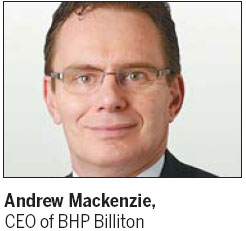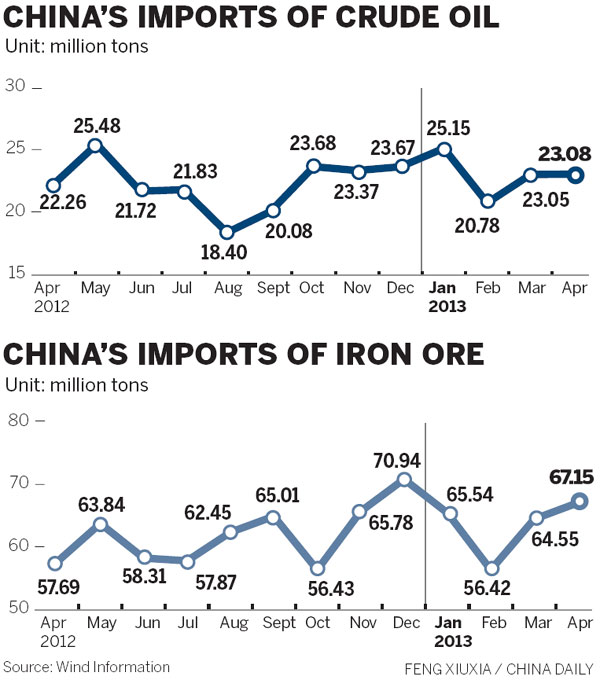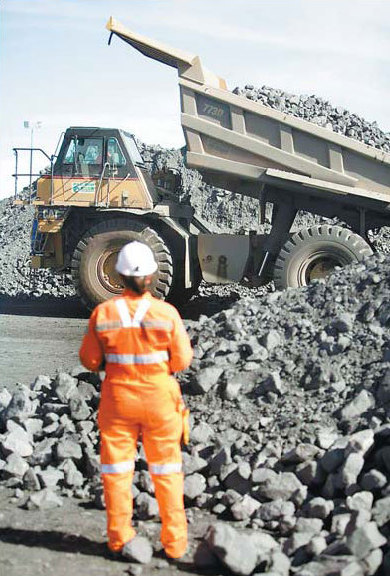BHP Billiton eyes more diversification
Updated: 2013-05-17 07:43
By Du Juan (China Daily)
|
||||||||
|
A worker looks on as a haul truck dumps ore at the BHP Biliton Cannington mine in Queensland, Australia. The company is preparing itself to become a more diversified energy and resources player, to adjust to global economic conditions. Reuters |
CEO Mackenzie sets his sights on conventional oil, LNG and shale gas
The new chief executive of BHP Billiton, the world's biggest mining company by market capitalization, says the company is preparing itself to become a more diversified energy and resources player, in order to adjust to global economic conditions.
Andrew Mackenzie, a Scot who officially took the helm of the company last week, said BHP has a number of exciting options for the future, including in conventional oil and gas, liquefied natural gas and more recently shale oil and shale gas.
"I will work with our new team to understand how best to invest in petroleum in the future and what weight to place in those areas," he said during an interview in Beijing.
As the world's largest iron ore consumer, China's demand for the commodity has been slowing considerably, which has affected the production and investment plans of producers around the world, forcing many to seek other opportunities to ensure profitability and long-term sustainable development.
The Wall Street Journal earlier this week reported that BHP is planning to reduce its capital expenditure "quite significantly" in coming years as a result of the world slowdown, with some suggesting that could be by as much as a fifth.
But speaking to China Daily, Mackenzie said that BHP has specific plans for China.
"It's very appropriate that my first public duty as CEO of BHP is to come here to the home of our most important customers," he said.
"China will want to import petroleum products to fuel its growth moving forward.

"The next phase of planned growth envisages an increase in domestic consumption, and that will almost certainly lead to a strengthening in demand in oil and gas, coal and possibly uranium," he said.
To meet those demands in China, Mackenzie said BHP's diversified investment in its energy businesses will ensure what he called a plentiful and fairly priced energy supply to an economy which he said he is confident will continue to grow.
According to the General Administration of Customs, China imported 271 million metric tons of crude oil last year, a rise of 6.8 percent compared with the previous year, as demand remained high despite the economic slowdown.
According to industrial analysts, around 60 percent of China's oil demand will depend on the overseas market by 2020.
Mackenzie's visit will be followed in July by that of Tim Cutt, as head of the company's petroleum department, who has spent the past 25 years with Mobil and then ExxonMobil, including as president of ExxonMobil de Venezuela, which is being read by analysts as a strong indication of the company's emphasis on the oil sector.
Mackenzie conceded that it is possible, but not necessary, that the company increases its percentage of investment in the petroleum sector, adding that oil is likely to be a "significant part of BHP's offer" in future.
At present, the company's oil and gas arm, Houston-based BHP Billiton Petroleum, operates shale oil production in Eagle Ford and Permian Basin operations in Texas.
Talking to investors in Barcelona recently, Mackenzie was quoted as saying it aims to increase its oil output by 66 percent to a daily production of 200,000 barrels by 2015.
But he said: "We are not a new player in oil and gas industries. BHP entered the business in the 1960s.
"We just didn't choose to form an integrated industrial chain from upstream to downstream. We have kept ourselves in the upstream business."
Zhang Tieshan, a senior analyst from the industrial information provider Mysteel.com, said that falling iron ore prices have had a huge effect on the profits of global miners, including BHP, Rio Tinto PLC and Vale Ltd.
"It makes good sense for BHP to tend to its oil and gas business, against the background of shrinking iron ore demand from China," he said.
"Although India's economic growth will create new iron ore demand on the international market, it will not be big enough to make up for China's slowdown."
And China's growing number of automobiles and other vehicles will ensure a growing demand for oil, Zhang said.
"So it is not hard to understand the benefits for companies like BHP to grasp these new growth opportunities."
However, experts expect BHP and other international players to continue to be hugely influential in the iron ore sector.
"China's iron ore demand will continue to grow even though the growth will slow," said Li Xinchuang, deputy secretary of the China Iron and Steel Association.
China will import up to 800 million tons of iron ore this year, he said. At present, up to 70 percent of China's iron ore consumption depends on foreign supply.
Mike Henry, BHP's head of technology, marketing and health and safety, added that iron ore prices will gradually decline over time.
That decline in prices and demand, he said, was mainly caused by increasing supply from new mines put into operation as well as China's economic slowdown.
"Chinese steel production over the past decade was growing at more than 15 percent annually, 1.5 times its GDP growth. We expect this growth going forward to be half the GDP growth, so steel production will grow only at 3 percent to 4 percent annually in the following years," said Henry.
"It will mean that iron ore demand will grow at only 3 percent to 4 percent annually."
BHP's new capacities are in western Australia, where a number of projects will be completed in the next two years.
Besides its oil and gas projects, it has also started some new business activities in copper, coal, aluminum and nickel.
Its copper output in 2012 grew 11.2 percent compared with 2011 to about 1.16 million tons, while China's copper consumption in the last year was about 8 million tons.
"Although we still see many opportunities to supply an increasing amount of iron ore to the world and China, we are aware of the economic trends that lead to different needs in the future," said Mackenzie.
"As a resources company, it's very important that we have options available to grow in steel, energy, and possibly in fertilizer and food in future."
The board of BHP announced Marius Kloppers' retirement as CEO on Feb 20, describing Mackenzie as "the right person to lead BHP in a changing global environment".
Kloppers had worked for BHP for almost 20 years, the last six as CEO after being appointed just prior to the global financial crisis.
"When Marius began, he had a huge challenge to increase the supply that China needed in the most effect way possible," Mackenzie said.
"But very quickly he had to handle the impact of the global financial crisis in 2008 followed by the very quick restoration of high growth, partly caused by the stimulus measures that were put in place in China in 2008."
He added that he has a different set of challenges at the start of his time as CEO.
"About 18 months ago, for many of our products, supply and demand became more imbalanced," he said.
"Following a period of very high volatility, we now have to handle the expectation of prices that are likely to be constant or falling."
dujuan@chinadaily.com.cn

(China Daily 05/17/2013 page15)

 Michelle lays roses at site along Berlin Wall
Michelle lays roses at site along Berlin Wall
 Historic space lecture in Tiangong-1 commences
Historic space lecture in Tiangong-1 commences
 'Sopranos' Star James Gandolfini dead at 51
'Sopranos' Star James Gandolfini dead at 51
 UN: Number of refugees hits 18-year high
UN: Number of refugees hits 18-year high
 Slide: Jet exercises from aircraft carrier
Slide: Jet exercises from aircraft carrier
 Talks establish fishery hotline
Talks establish fishery hotline
 Foreign buyers eye Chinese drones
Foreign buyers eye Chinese drones
 UN chief hails China's peacekeepers
UN chief hails China's peacekeepers
Most Viewed
Editor's Picks

|

|

|

|

|

|
Today's Top News
Shenzhou X astronaut gives lecture today
US told to reassess duties on Chinese paper
Chinese seek greater share of satellite market
Russia rejects Obama's nuke cut proposal
US immigration bill sees Senate breakthrough
Brazilian cities revoke fare hikes
Moody's warns on China's local govt debt
Air quality in major cities drops in May
US Weekly

|

|








